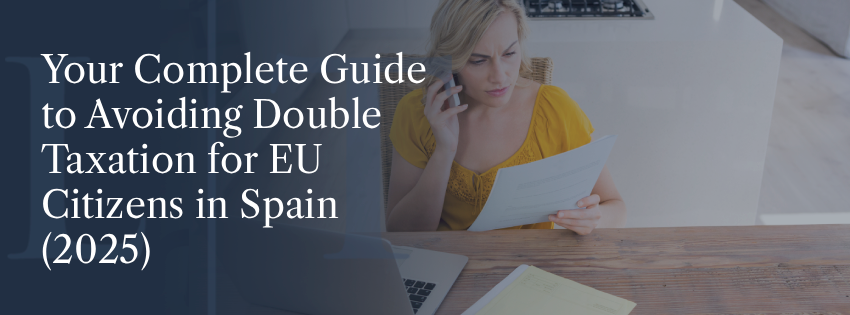At Lextax, we’ve guided hundreds of EU citizens through their move to Spain. We understand the excitement of starting a new chapter here—the vibrant culture, the Mediterranean lifestyle, the endless sunshine. We also know that navigating Spanish tax law can feel complex and overwhelming.
That’s why we act as your “translator of complexity.” Our mission is to make intricate rules clear, simple, and manageable. This guide will walk you through the essentials of double taxation, but our true goal is to provide you with clarity and peace of mind.
Your Quick Answer: How Do EU Citizens Avoid Double Taxation in Spain?
In 2025, avoiding double taxation involves four key steps:
- Determine Your Tax Residency: Confirm if Spain considers you a tax resident.
- Consult the DTA: Check the Double Taxation Agreement (DTA) between Spain and your home country.
- Apply for Relief: Use the «exemption» or «credit» method defined in the DTA.
- Prove Foreign Tax Paid: Keep official certificates of tax paid abroad to claim your relief in Spain.
1. How Do I Know If I Am a Tax Resident in Spain in 2025?
Your tax residency status is the single most important factor. It determines whether Spain can tax you on your worldwide income or only on income generated within Spain.
You are considered a Spanish tax resident if you meet any of the following conditions:
- The 183-Day Rule: You spend more than 183 days in Spain within a single calendar year (January to December). Occasional absences are still counted towards your time in Spain.
- Center of Economic Interests: Your primary base of economic activities or professional interests is in Spain. For example, your main business or employer is here.
- Center of Vital Interests: Your spouse and/or dependent children reside in Spain (unless you can prove tax residency elsewhere)
What If Both Countries Claim I’m a Resident? The «Tie-Breaker» Rules
If both Spain and your home country consider you a tax resident under their domestic laws, the DTA applies a series of «tie-breaker» tests in a specific order to assign residency to just one country:
- Permanent Home: Where you have a permanent home available to you.
- Center of Vital Interests: The country where your personal and economic ties are closer.
- Habitual Abode: Where you have a habitual place of residence.
- Nationality: Your country of citizenship.
- Mutual Agreement: If all else fails, the tax authorities of both countries will decide by mutual agreement.
Lextax Insight: Determining residency using tie-breaker rules can be nuanced. The Lextax team can provide a definitive analysis of your status to ensure you are compliant from day one. [Schedule a consultation with our experts].
2. What Are Double Taxation Agreements (DTAs)?
Fortunately, you are not expected to pay full tax in two countries. Spain has comprehensive DTAs with every EU member state. These legal treaties, largely based on the OECD Model Tax Convention, exist to:
- Prevent the same income from being taxed twice.
- Provide clear rules on which country has the right to tax specific types of income.
- Combat tax evasion and encourage cross-border trade and investment.
3. How Is My Income Taxed Under a DTA?
Each DTA allocates taxing rights based on the type of income you receive. Here is a general breakdown of the most common scenarios for EU expatriates:
| Income Type | Primary Taxing Right | Lextax Note |
| Employment Income | Usually taxed where the work is physically performed. | Short-term exceptions exist, but require careful planning. |
| Business Profits | Taxed where your business has a «permanent establishment» (e.g., an office). | We help define if your activities create a permanent establishment. |
| Pensions | Public pensions (from government service) are typically taxed by the source country. Private pensions are usually taxed in your country of residence (Spain). | The distinction is critical and often misunderstood. |
| Investment Income | Taxed in your country of residence (Spain), but the source country may apply a reduced withholding tax (e.g., 15% on dividends). | Spain provides a credit for the tax withheld abroad. |
| Capital Gains | Often taxed where the asset is located (e.g., real estate). | Rules for shares and other assets vary significantly by treaty. |
4. What Are the Steps to Claim Double Taxation Relief in Spain?
Spain uses two primary methods to eliminate double taxation, as defined in its DTAs:
- Exemption Method: Income taxed abroad is exempt from tax in Spain, although it may be considered when calculating the tax rate on your other income.
- Credit Method (Most Common): You declare your worldwide income in Spain, and you receive a tax credit for the income tax you have already paid in the other country. This is the most common method.
Your Checklist for Claiming Relief:
- ✅ Confirm Your Residency: Be certain of your tax residency status.
- ✅ Read the DTA: Identify the specific article in your country’s DTA that applies to your income type.
- ✅ Get a Spanish Tax Residency Certificate: Essential for proving your status to foreign tax authorities.
- ✅ Obtain Proof of Foreign Tax Paid: You need an official certificate from the foreign tax agency.
- ✅ Apply Correctly: Claim the relief when filing your annual Spanish tax return (Modelo 100).
5. What Are the Tax Filing Requirements in Spain for 2025?
Staying compliant means knowing which forms to file and when.
- Modelo 100: The annual income tax return for Spanish residents. This is where you declare your worldwide income and claim double taxation relief.
- Modelo 210: The income tax return for non-residents who have Spanish-source income (e.g., from a rental property).
- Modelo 720 (Foreign Asset Declaration): A mandatory informational return where residents must declare significant assets held abroad (accounts, real estate, investments). While penalties have been reduced, failure to file can still trigger audits and significant complications.
- Beckham Law: A special tax regime for qualifying foreign professionals, allowing them to pay a flat 24% rate on their Spanish-sourced income only for up to six years.
⚠️ Important Note (August 2025): The Spanish Tax Agency (Agencia Tributaria) is increasingly focused on the foreign income and assets of residents. Missing deadlines or filing incorrectly can lead to penalties.
How Lextax Simplifies This for You
Navigating this landscape alone can be risky and stressful. As your «translator of complexity,» we turn confusion into clarity. Here’s how our expert team makes it simple:
- Definitive Residency Analysis: We provide a clear, legally-sound determination of your tax residency status.
- Strategic DTA Application: We analyze the specific treaty between Spain and your home country to legally maximize your tax relief.
- Flawless Filing: We handle all necessary filings, including Modelo 100, 210, and 720, ensuring accuracy and giving you complete peace of mind.
- Long-Term Tax Planning: We help you structure your assets and income to optimize your tax position in Spain for your entire future here.
Conclusion: Clarity and Compliance in Spain
Double taxation is a legitimate concern for EU citizens moving to Spain, but it is a problem with a clear solution. By understanding your residency status, correctly applying your country’s DTA, and maintaining proper documentation, you can ensure you pay the right amount of tax—and not a cent more.
For complex situations or for the assurance that your tax affairs are handled perfectly from the start, expert guidance is invaluable.
About the Author
[Insert a 2-3 sentence bio for the author here. Example: [Name] is the Head of International Tax at Lextax, with over 15 years of experience helping expatriates navigate Spanish tax law. He/She specializes in cross-border tax planning and is dedicated to providing clear and actionable advice for clients across the EU. Connect with [Name] on LinkedIn.]
External Resources:
- Agencia Tributaria – Official Spanish Tax Agency Website.
- EU Your Europe – Taxation – General Information on Double Taxation in the EU.


